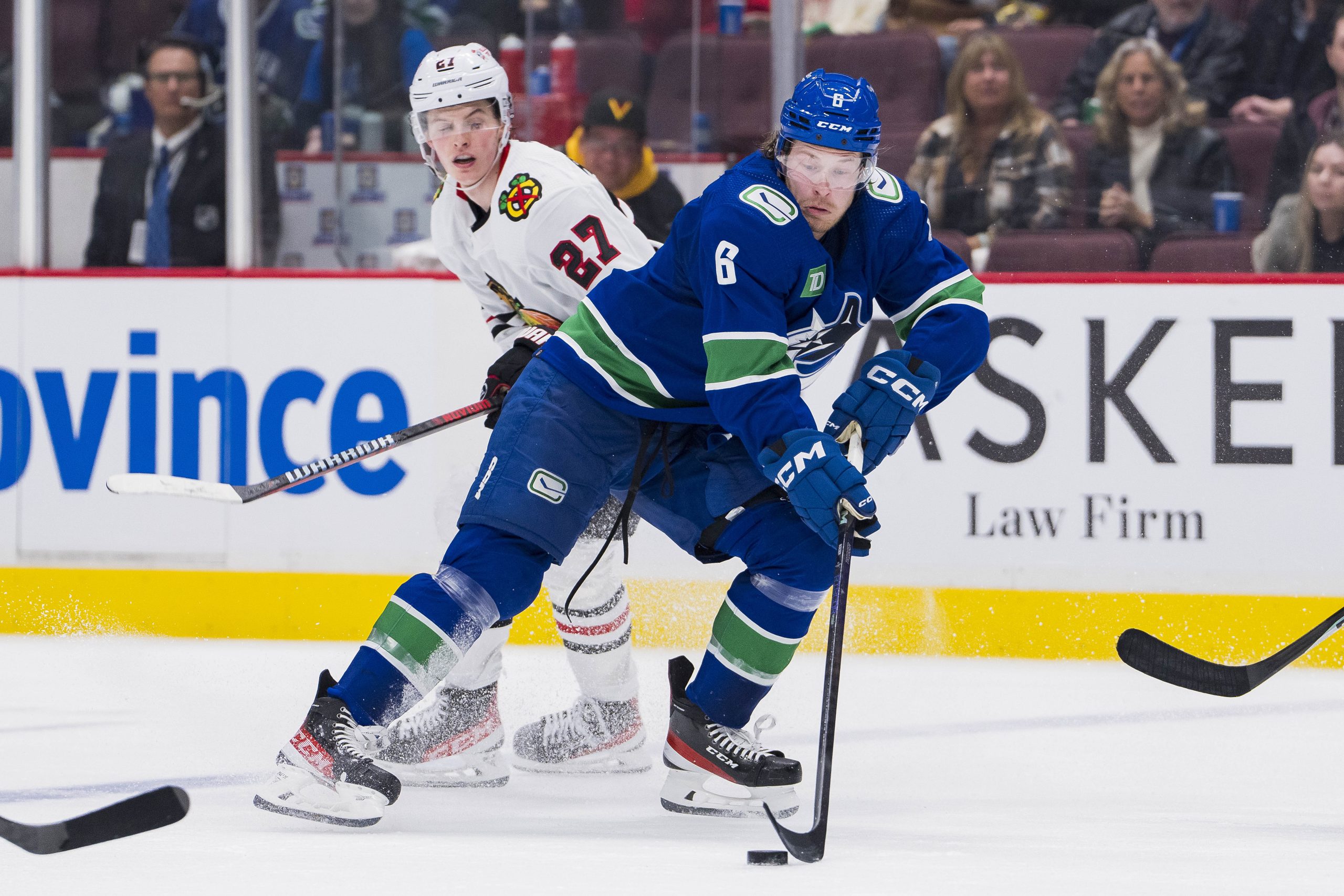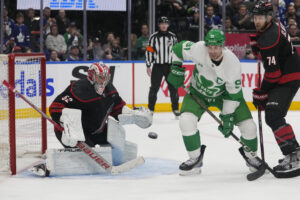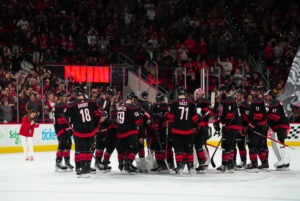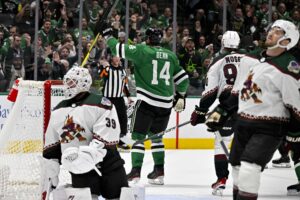The Vancouver Canucks are looking more and more like they are keeping Brock Boeser despite earlier trade requests. That might be the best choice for him, but at what cost?
About Keeping Brock Boeser
Brock Boeser has, it’s safe to say, a tumultuous past with the team that drafted him. From an excellent rookie season to last year’s trade request, his six NHL seasons have been lively ones.
Disrupted seasons on the ice and emotional turmoil off of it make his career a difficult one to compare year-to-year. His skill set is supposed to be an obvious one – but injuries have already taken their toll.
“It was a long year; I went through some stuff,” he said. “I’m trying to explain this right. It’s hard for people to understand the aftereffects of what I went through. Unless you really go through this, you can’t understand what it’s like dealing with a (dying) family member. I really blamed hockey for not being home with my dad. That was a big challenge I worked through this year. And with my hand injury, then the trade rumours, and I wasn’t playing good – it just all was a lot.”
A once-terrifying shot is hampered by a surgically-repaired wrist and still hasn’t quite returned to its old form. But it’s improving. His supposedly-weak defensive play improved noticeably in 2021-22, only to fall back the next year. Skating – already his weakest virtue – took repeated hits with back, rib, and groin injuries.
Fortunately, if you want to call it that, while injuries have been a constant theme for Boeser, they aren’t recurring ones. But he has had a surprising number for a young player who isn’t particularly physical. That is sure to have kept possible landing points from pressing too hard to get him in a trade, but it’s not the only reason.
Money, Money, Money
The Canucks former general manager was in a tight spot before the 2019-20 season began. One of the team’s top young players was holding out for a deal more closely linked to his talent than his numbers. At just 23 years old, the odds were good that keeping Brock Boeser was the smart play. Scoring 59 goals in 140 NHL games gets players paid well on their second deals.
But the money wasn’t there. So Jim Benning placed a bet: a bridge contract of three years, but a rapidly escalating base salary. By the time renewal came up, Boeser would be qualified for year three’s $7.5 million value, not his sub-$6 million average. If an injured Boeser averaged a 30-goal pace, what could an uninjured one reach?
About a 30-goal pace, as it happens. As it happened, some rules were re-written that helped Canucks management with how contracts would be negotiated in the flat-cap, COVID-cancelled era. But that qualifying offer still loomed large in the minds of Boeser and his agent.
Vancouver, of course, hadn’t gotten any better as a team during those bridge years, and now had to face losing one of their few reliable scorers. Boeser, of course, had little in the way of leverage, given how his time went. Still, another compromise was reached with another bridge deal, and Boeser promised his first 30-goal season. Which he didn’t exactly live up to.
The Goal is Goals
A disastrous start by Vancouver was sort of mirrored by Boeser. It’s true that he didn’t score his first goal until the season was 12 games old. On the other hand, he had nine assists in his first 11 games, and that’s not nothing. The trend continued through the year as he hit a career-high 37 assists. But those aren’t what he’s being paid for.
It was revealed early on in 2022-23 that he had requested a trade from Vancouver, and the team tried to oblige. Even with his agent involved, nothing could be reached on that front, though. He has since rescinded the trade request – perhaps because of the change in coaches – the question remains: now what?
It’s no secret that the Canucks are trying to shed salary. Indeed, reports on their efforts have been as continuous this year as reports of Boeser being traded in past ones. Given the excess of wingers on the team, it’s a surprise to hear he’s no longer being actively shopped. His $6.65 million price tag is certainly part of it, as is his dropping goal production.
Teams across the league are looking for not just a discount but a sweetener for taking Boeser on. And to be fair, that’s a lot of money for not much production in pure scoring. Were he $1.5 million cheaper, it would be an easier sale. Retaining salary, while not great, is cheaper than any buyout.
The Canucks have looked, and the cost of keeping Brock Boeser is cheaper than the cost of moving him out. The more interesting story is Boeser himself arranging for a meeting with general manager Patrik Allvin asking to stay.
Sticking With Boeser Means Moves Elsewhere
Boeser has been through a lot. Far more than someone his age normally would. That he managed to keep any focus at all on his game is a credit to him. From that perspective alone, it is well worth seeing what he can do with a new year to look forward to.
But financial realities for the club remain, and something needs to happen. Easiest to ignore all the postures and feints from Commissioner Gary Bettman about whether or not the salary cap will rise any significant amount. Assume the worst, prepare for the worst, and do the math.
Any potential help coming from Canucks prospects will be in the form of wingers. With both Vasili Podkolzin and Nils Höglander gaining experience in the AHL and NHL last year, those are the likely call-ups. Or, possibly, trade bait. Unless the return is substantial, though, that seems short-sighted.
Still, contracts have been signed. As a nod to financial reality, two useful defenders may be lost in Noah Juulsen and fan favourite Kyle Burroughs. That doesn’t help the Canucks depth on the blue line, but both are 6/7 defensemen rather than top-four. While they might crack the starting roster, they will more likely continue that role, here or elsewhere.
Ethan Bear still needs to be signed, which raises the curious question of his market value. He’s needed in Vancouver, certainly, but how hard will he play that hand? Ask for too much, and it could be his name added to a money-moving deal.
Affronted Up Front
The reality is that Vancouver isn’t likely going to make many major deals. Even if Conor Garland or Tyler Myers or Anthony Beauvillier get traded away, that’s just one part of doing what it takes to fix this team. What should have been an earth-shaking deal in moving Bo Horvat has instead been just a start.
Switching the cap deployment from forward to defence was a decent move, especially given Horvat’s contract ask. But it needs to continue. And while it would be great for it to keep going this offseason, the reality is that it may stop here. Time will help solve what trades did not.
Ilya Mikheyev is going to play the full season, but Tanner Pearson and Tucker Poolman will likely not. If the cost of moving cap space out is too high, then the Canucks may simply decide to go into Long-Term Injured Reserve once again.
That will mean moving nearly $5 million worth of players to the AHL at the start of the year, but it can be done. It also means getting nothing in the free agent market, but that’s the price to pay.
Staying completely still on the salary cap is unlikely, especially with Vancouver keeping Brock Boeser. But if the only offers they get are anchors, they can choose to float there a little longer.
Hat tip, as always, to CapFriendly.
Main Photo: Bob Frid-USA TODAY Sports






